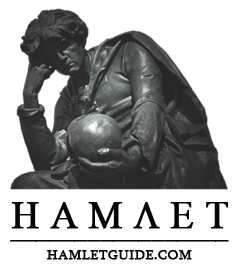

![]()
| Madplay,
Wordplay, Inner-play by James L. Calderwood |
| A great many truths interest Hamlet,
but the ones he must find a voice for are of two kinds. There are
the fundamental truths imparted to him by the ghost: the secret
facts about his father's murder and his mother's faithless
remarriage. Then there are the truths about the human condition
that seem entailed by these primary facts: all the melancholy
distresses that Hamlet registers about a mutable world in which the
cosmetics of lies and false seeming conceal the moral ugliness of
evil. These latter truths Hamlet both tells and untells in his
wordplay, engaging in a verbal balancing act between silence and
noise that is paralleled by his assuming an antic disposition that
lies between inaction and action. Regarding action: Hamlet's predicament is cause by his need to reconcile the Ghost's command, "Revenge his foul and most unnatural murder," and its perplexing codicil, "But, howsomever thou pursues this act,/ Taint not they mind" (1.5.26, 5—86). How to act within a tainted world without becoming tainted oneself? How, on the other hand, not to act without suffering the stigma of filial betrayal? Hamlet's solution for the moment is to take refuge in the cleft between action and inaction. He does not act but instead "acts," that is, plays mad, which plays his behavior in epoche, zoned off from the world of pragmatic affairs in which action and inaction have no meaning. Hamlet's antic disposition thus becomes a form of inactive action, to which the verbal analogy is the unvoiced speech of his wordplay. And inasmuch as play is largely an end in itself rather than a means to other ends, so Hamlet's wordplay fails to communicate the truth in Denmark and his madplay fails to kill the King. Part of the reason for this suspension of action and speech is that Hamlet is not altogether persuaded that the Ghost's truths are truths, or even that the Ghost is merely a ghost.
The way to resolve his uncertainties about the Ghost, about Claudius, and about his own imagination is, he decides, theatrical: "The play's the thing/ Wherein I'll catch the conscience of the King" (2.2505-606). The way to resolve his verbal and actional dilemmas is also theatrical. In rewriting and presenting "The Murder of Gonzago" he will accept his own advice to the players and "Suit the action to the word, the word to the action" (3.2.17-18). The silent truths about murder in the orchard and remarriage in hast will be made manifest to eyes and ears —
Silence thus acquires a voice to make its meanings heard, if not by everyone, at least by Claudius. Like Hamlet's wordplay and madplay. "The Murder of Gonzago" in its original form was presumably an artistic end in itself. As revised by Hamlet, however, it becomes "The Mousetrap." Dramatic art is transformed into pragmatic instrument, a weapon in the real world. Suited mutually to one another to comprise the dramatic ensemble, words now act and acts speak, so that in one concerted motion the truth is conveyed to Claudius with the impact of a sword thrust. |
![]()